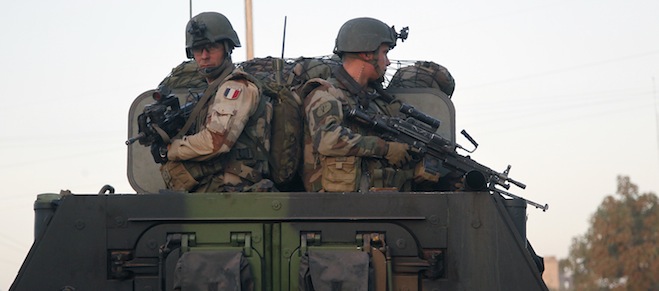Cheese-eating surrender monkeys go to war: Why France is in Mali
… and why the rest of the world is keeping its distance
Share

Is there are a French television show equivalent of The Simpsons? If so, its writers should start working on some catchy anti-American slurs that imply military cowardice.
It was The Simpsons, back in 1995, that first dubbed the French “cheese-eating surrender monkeys” — a phrase that gained renewed currency in the run-up to the 2003 Iraq war, which France declined to join.
The barb stuck, at least in America, Britain and Canada, where it played into popular perceptions about France’s quick defeat and subsequent collaboration in the Second World War, and about its perceived disdain for America and Britain in general. For defenders of France, the sneer simply underlined America’s supposed penchant for imperialism in contrast to France’s preference for diplomacy and multilateralism.
These stereotypes were not accurate then and aren’t now. France has always been willing to act with force, and without permission, when doing so suited its interests. And from France’s perspective, many of its interests are in its former colonies in Africa. It’s not surprising then that on Friday France launched a military intervention in Mali, where al-Qaeda and other Islamists have taken over the northern half of the country and were poised to push south, threatening the capital Bamako.
Some 800 French troops are there now and more are on their way. France has conducted air strikes and stopped the Islamists’ advance; though so far it seems Mali’s poorly trained soldiers on the ground are having trouble holding territory that has been softened for them by French bombs. West African soldiers are en route to help. How effective they’ll be is questionable. One Africa analyst predicted that, on their own, they would be “swallowed by the desert.”
The African Sahel, and especially northern Mali, is arguably where al-Qaeda is now strongest. It controls territory roughly the size of France, and its allies are causing havoc and distress from Nigeria to Somalia (where this weekend an unsuccessful French raid to rescue an intelligence agent held captive by the Islamist group al-Shabaab resulted in the deaths of two French soldiers).
Al-Qaeda’s African franchise, known as Al-Qaeda in the Islamic Maghreb, preaches a revolutionary jihadist agenda. It has been blamed for attacking the U.S. consulate in Benghazi, Libya, killing Ambassador J. Christopher Stephens and three other Americans. One of its leaders (who in 2008 kidnapped Canadian diplomats Robert Fowler and Louis Guay) can be found on Internet videos promising to raise the banner of Islam from where the sun rises to where it sets.
Most Malians, so far at least, seem to welcome foreign intervention. They’ve been asking for it for months. Hundreds of thousands of them have fled Islamist-controlled areas in the north, bringing with them tales of stonings and amputations. Al-Qaeda and its Islamist allies lack sophisticated weaponry and operate in sparsely populated areas. While wars have a way of developing in unexpected and unwanted ways and should therefore be entered with caution, the case for intervention in Mali is persuasive.
And yet France is waging this battle virtually alone among Western nations. Britain is sending a couple of planes. Canada is sending one. The United States, which a decade ago declared a worldwide war on terror, has pledged “total solidarity,” and is offering in-flight refuelling along with with some intelligence and logistical help. U.S. Defense Secretary Leon Panetta says America isn’t considering sending troops. He’s in Europe at the moment but is skipping Paris.
One of the side effects of the wars in Iraq and Afghanistan has been the hesitancy of most of the West, and especially America, to contemplate sizeable military interventions elsewhere. The United States relies increasingly on assassin drones to advance its strategic objectives. Its involvement in Libya was reluctant and limited. Our withdrawal from Afghanistan continues, regardless of Afghans’ readiness to secure their country. Canadian Prime Minister Stephen Harper today is a lot less bellicose about standing up to Middle Eastern thugs than he once was.
What this means for belligerents across the world is that, absent bombs in Toronto or Washington, we’re keeping our distance. Many will welcome this. Some won’t. If Syrians, whose uprising against the regime of Bashar al-Assad has resulted in more than 60,000 dead, still needed convincing, they must now know that the American cavalry isn’t coming. They might try calling on the French.